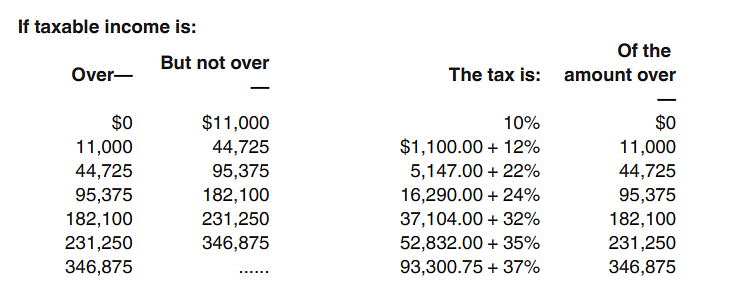
Trusts Don’t Save you Money on Taxes
Clients come to me all the time looking to add a trust to their business structure in order to reduce their tax bill. The vast majority of the time, after a review of their structure, I conclude that a trust is not the best move for tax savings, as it is rare to reduce your tax bill through the use of a trust.
There are two types of trusts which the IRS recognizes—grantor and non-grantor trusts. Grantor trusts are not taxed at the entity level, but rather the income and loss from the trust flows through to the owner. The result is that a grantor trust has no impact on your tax bill. Non-grantor trusts are not flow-through entities, so non-grantor trust income is taxed at the entity-level. Below are the current tax rates for non-grantor trusts.
 These tax rates are actually the highest entity-level tax rates that the IRS charges. Corporations, which are the other entity type with entity-level tax, are taxed at 21%. Thus, if you are to hold your money in a non-grantor trust, your tax bill will likely increase.
These tax rates are actually the highest entity-level tax rates that the IRS charges. Corporations, which are the other entity type with entity-level tax, are taxed at 21%. Thus, if you are to hold your money in a non-grantor trust, your tax bill will likely increase.
Trusts are great for organizing your income and allocating income to loved ones, so if you are looking to achieve this, it does not hurt to add a grantor trust to your structure, as it will not increase your taxes. However, if you are looking to hold money in the trust as well through a non-grantor trust, just know that it is likely you will be increasing your tax bill.
That said, in rare circumstances, non-grantor trusts can be used to decrease your tax bill, but only if your facts and circumstances line up. For example, I had a client recently who was able to reduce his tax bill through the use of a non-grantor trust. The client was the sole owner an LLC which was earning about $500,000 per year in net income. The client engaged in a reorganization, whereby a non-grantor trust was made a 50% owner in the LLC, and the client personally remained the owner of the other 50% of the LLC. Through this reorganization, the trust received $250,000 and the client personally received $250,000 in net income. Through dividing the net income between the client personally and the non-grantor trust, both the client and the trust’s tax bracket was lowered, reducing the effective tax rate on the LLC income.
The above example would not work, however, if the LLC had been earning $700,000 or more in net income, as splitting the income in two would still result in both the client personally and the non-grantor trust being taxed in the highest tax bracket. So while there are exceptions to the rule that trusts do not save you money on taxes, they are rare and only apply where your net income is low enough that you can play with tax brackets in order to lower your tax impact.

